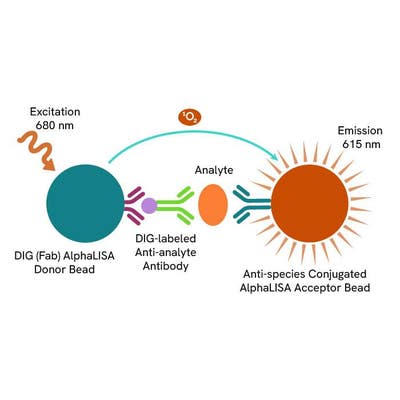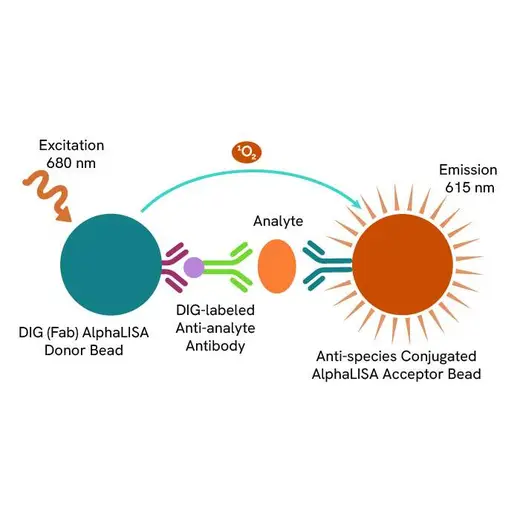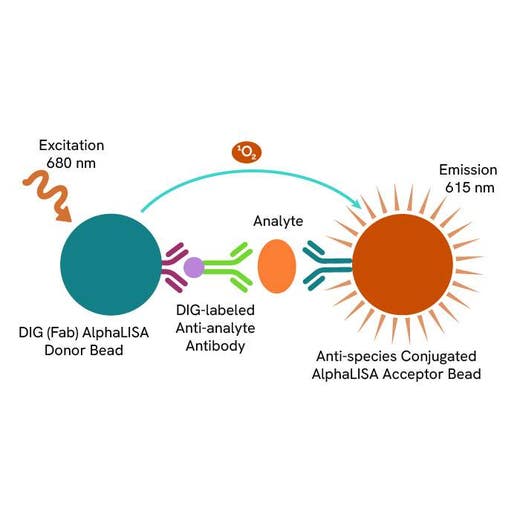
AlphaLISA High Performance Biotin-Free Human TNFα Detection Kit, 100 Assay Points


AlphaLISA High Performance Biotin-Free Human TNFα Detection Kit, 100 Assay Points






The AlphaLISA™ High Performance (HP) Biotin-Free Human TNFα Detection Kit is designed for the quantitative determination of human TNFα in serum, buffered solution, or cell culture medium using a homogeneous (no wash steps, no separation steps) assay.
This kit is the new and improved version of part number AL325.
| Feature | Specification |
|---|---|
| Application | Protein Quantification |
| Dynamic Range | 7.88 - 100,000 pg/mL |
| Limit of Detection | 7.88 pg/mL |
| Limit of Quantification | 31.12 pg/mL |
| Sample Volume | 10 µL |
The AlphaLISA™ High Performance (HP) Biotin-Free Human TNFα Detection Kit is designed for the quantitative determination of human TNFα in serum, buffered solution, or cell culture medium using a homogeneous (no wash steps, no separation steps) assay.
This kit is the new and improved version of part number AL325.



AlphaLISA High Performance Biotin-Free Human TNFα Detection Kit, 100 Assay Points



AlphaLISA High Performance Biotin-Free Human TNFα Detection Kit, 100 Assay Points



Product information
Overview
Tumor necrosis factor alpha (TNFα) is a multifunctional proinflammatory cytokine synthesized mainly by nucleated blood cells as a 233 aa type II transmembrane protein which is cleaved by ADAM17 between aa 76-77 to form a soluble homotrimeric complex. TNFα plays a role in lipid metabolism, coagulation, and endothelial function and has been associated with cancer, infection and inflammation (including inflammatory bowel disease), ischemia/reperfusion injury and heart failure, and insulin resistance.
TNFα Biotin-Free Detection Kit Formats
- Our 100 assay point kit allows you to run 100 wells in 96-well format, using a 100 µL reaction volume (10 µL of sample).
- Our 500 assay point kit allows you to run 500 wells in 96-well or 384-well format, using a 50 µL reaction volume (5 µL of sample).
- Our 5,000 assay point kit allows you to run 5,000 wells in 96-well or 384-well format, using a 50 µL reaction volume (5 µL of sample).
Features
- No-wash steps, no separation steps
- ELISA alternative technology
- Sensitive detection
- Broad sample compatibility
- Small sample volume
- Results in less than 3 hours
- Half the time of an ELISA assay
AlphaLISA technology allows the detection of molecules of interest in a no-wash, highly sensitive, quantitative assay. In an AlphaLISA assay, a biotinylated anti-analyte antibody binds to the Streptavidin-coated Donor beads while another anti-analyte antibody is conjugated to AlphaLISA Acceptor beads. In the presence of the analyte, the beads come into close proximity. The excitation of the Donor beads causes the release of singlet oxygen molecules that triggers a cascade of energy transfer in the Acceptor beads, resulting in a sharp peak of light emission at 615 nm.
Specifications
| Application |
Protein Quantification
|
|---|---|
| Automation Compatible |
Yes
|
| Brand |
AlphaLISA
|
| Detection Modality |
Alpha
|
| Dynamic Range |
7.88 - 100,000 pg/mL
|
| Limit of Detection |
7.88 pg/mL
|
| Limit of Quantification |
31.12 pg/mL
|
| Product Group |
Kit
|
| Sample Volume |
10 µL
|
| Shipping Conditions |
Shipped in Blue Ice
|
| Target |
TNFα
|
| Target Class |
Cytokines
|
| Target Species |
Human
|
| Technology |
Alpha
|
| Therapeutic Area |
Autoimmunity
Cardiovascular
Immuno-oncology
Inflammation
Neuroscience
Oncology
|
| Unit Size |
100 Assay Points
|
Video gallery

AlphaLISA High Performance Biotin-Free Human TNFα Detection Kit, 100 Assay Points

AlphaLISA High Performance Biotin-Free Human TNFα Detection Kit, 100 Assay Points

Resources
Are you looking for resources, click on the resource type to explore further.
Our R&D scientists were determined to enable your research by developing new and improved versions of our AlphaLISA cytokine...
Emerging pathways to neuroinflammation and neurodegeneration
Neurodegenerative diseases, such as amyotrophic lateral sclerosis...
Cytokines play a vital role in both innate and adaptive immunity and are known for their ability to exert diverse functions on...
One approach to immunotherapy is the modulation of immune checkpoints that are critical in regulating the degree and duration of...
Advance your autoimmune disease research and benefit from Revvity broad offering of reagent technologies


How can we help you?
We are here to answer your questions.






























